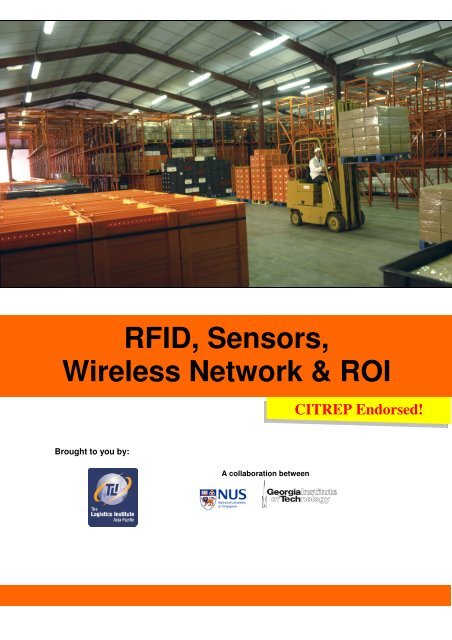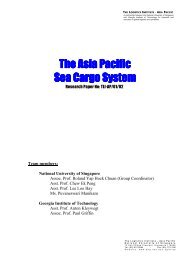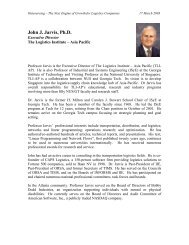RFID, Sensors, Wireless Network & ROI - The Logistics Institute ...
RFID, Sensors, Wireless Network & ROI - The Logistics Institute ...
RFID, Sensors, Wireless Network & ROI - The Logistics Institute ...
Create successful ePaper yourself
Turn your PDF publications into a flip-book with our unique Google optimized e-Paper software.
<strong>RFID</strong>, <strong>Sensors</strong>,<br />
<strong>Wireless</strong> <strong>Network</strong> & <strong>ROI</strong><br />
CITREP Endorsed!<br />
Brought to you by:<br />
A collaboration between
<strong>RFID</strong>, <strong>Sensors</strong>, <strong>Wireless</strong> <strong>Network</strong> & <strong>ROI</strong>: A 4-Day Course<br />
Target Audience: This course is organised by <strong>The</strong> <strong>Logistics</strong><br />
<strong>Institute</strong> – Asia Pacific (TLI-AP) with subject experts from the<br />
USA. Participants will consists of potential <strong>RFID</strong> users and<br />
decision-makers from a broad spectrum of the <strong>Logistics</strong> and<br />
ICT Industry.<br />
Objectives of Course: This course introduces the important<br />
topic of Radio Frequency Identification (<strong>RFID</strong>). It will provide<br />
an excellent overview to the executives, engineers and<br />
managers that need to understand the terminology of the<br />
topic, and its applications. It reinforces the material learned<br />
with on-hands experience with <strong>RFID</strong> tags, readers, and<br />
signals captured by antennas. It further provides a<br />
background overview of <strong>RFID</strong>, <strong>Sensors</strong> and <strong>Wireless</strong><br />
technology and explain the important integration concepts for<br />
the participants to learn the integration techniques required<br />
for a complete solution. <strong>The</strong> course ends with application<br />
scenarios, best practices, techniques and models for<br />
measuring and managing the business value and <strong>ROI</strong> for a<br />
solution.<br />
DAY 1<br />
Part I – Setting <strong>The</strong> Stage<br />
Course Admin – Registration and course administration,<br />
welcome address, attendance, ice breaker introduction<br />
Pre-course assessment (MCQ)<br />
Definition of <strong>RFID</strong><br />
Examples of <strong>RFID</strong> in our world<br />
<strong>RFID</strong> infrastructure<br />
• Tags<br />
• Readers<br />
• Antennas<br />
• Middleware<br />
• Standards<br />
Making the decision to deploy <strong>RFID</strong><br />
Road map to implementation<br />
Experiment 1 – <strong>RFID</strong> Basics<br />
Placing tags, reading tags, collecting data from tags,<br />
converting that data to use for an appropriate purpose<br />
Active solutions<br />
Passive solutions<br />
Part II – Past, Present, and Future of <strong>RFID</strong><br />
<strong>The</strong> history of <strong>RFID</strong><br />
Comparison to barcodes<br />
Electronic data interchange<br />
EPCglobal networking<br />
Global data synchronization<br />
Part III – Detailed View of <strong>RFID</strong><br />
Antennas<br />
Integrated circuit<br />
PCB/Substrate<br />
Active tags, semi-active tags, passive tags, semi-passive<br />
tags, etc.<br />
EPCglobal tag classification<br />
Operating frequencies<br />
RF characteristics<br />
• Data rate<br />
• Permittivity<br />
• Distance<br />
• Command set<br />
• Regulation<br />
• Reader components<br />
• Tag & reader communication<br />
Experiment 2 – <strong>RFID</strong> Characteristics<br />
Experimenting with different kinds of tags in different<br />
environments to understand the operating<br />
characteristics of tag and reader communication.<br />
Active solutions<br />
Passive solutions<br />
DAY 2<br />
Part IV – Privacy and Security<br />
<strong>The</strong> issues that have been raised<br />
Specific examples that are sensitizing the public<br />
(passports, for example)<br />
Guidelines that are being considered<br />
Global activities to insure privacy<br />
Experiment 3 – <strong>RFID</strong> Enhanced Solutions<br />
See examples of enhanced solutions such as:<br />
IR-SignPost technology<br />
Acoustic-SignPost technology<br />
Multi-Antennae design<br />
Learn the limits of the ability to read tags and effects of<br />
shields to block the ability to read tags. Examine<br />
pitfalls to avoid when considering environmental and<br />
human factors.<br />
Part V – Interesting and Unusual Appln<br />
Cold Chain<br />
Tracking<br />
Racing<br />
Part V – <strong>The</strong> Business Case<br />
Parameters and costs<br />
Industry benchmarks<br />
Calculating return on investment (<strong>ROI</strong>)<br />
DAY 3<br />
Part VII – <strong>Wireless</strong> Background<br />
Provide a background and understanding of<br />
currently available and emerging Personal Area<br />
<strong>Network</strong> technologies such as IR, Bluetooth, UWB-<br />
USB.<br />
Understand <strong>Wireless</strong> LAN options and<br />
configurations for WiFi – 802.11 a/b/g/n<br />
Positioning and purpose of MANs, Distribution and<br />
Backhaul Systems such as MuniWifi, WiMAX<br />
(802.16-2004 and 802.16e), and WiBro<br />
Understand cellular technology and service such as<br />
1XRTT, GSM/GPRS/EDGE/HSDPA, UMTS, CDMA,<br />
FOMA<br />
Review of device configuration and software<br />
development options and trends<br />
Identify Satellite System Options such as GEO,<br />
LEO, MEO
<strong>RFID</strong>, <strong>Sensors</strong>, <strong>Wireless</strong> <strong>Network</strong> & <strong>ROI</strong>: A 4-Day Course<br />
Understanding of GPS and how it relates to wireless<br />
systems and Location Based Services<br />
Explore emerging trends and directions in wireless such as<br />
4G, MIMO, Mesh <strong>Network</strong>s, Unified <strong>Network</strong>s, Cognitive<br />
Radio<br />
Review of Security Risk and Mitigation for <strong>Wireless</strong><br />
systems<br />
Part VIII – <strong>Wireless</strong> Sensor <strong>Network</strong><br />
Sensor basics – types of sensors and how they work<br />
Options for tracking in-building and tradeoffs of systems<br />
using WiFi, active <strong>RFID</strong> and other approaches<br />
Techniques for determining location: choke point basics,<br />
room/regional approach, triangulation, cricket, UWB, Smart<br />
Finger Prints<br />
Understand the tradeoffs in accuracy, costs, and<br />
complexity of choosing Real Time Tracking Systems<br />
Item level tracking – HF, UHF, RuBee and UWB<br />
<strong>Wireless</strong> Sensor <strong>Network</strong>s: ZigBee, Insteon, Zen-sys and<br />
Proprietary systems<br />
Types of <strong>Wireless</strong> Mesh Architectures – and why Mesh is<br />
important: <strong>Network</strong> Architectures, Security Architectures<br />
and Application Frameworks<br />
GPS and how it relates to the tracking cycle for end-to-end<br />
visibility: passive, active and semi-passive<br />
<strong>The</strong> evolving role of battery assisted passive tags<br />
Tying it all together – how sensors, wireless networks and<br />
<strong>RFID</strong> can be integrated for new levels of performance and<br />
types of functionality/solutions<br />
How wireless communications is related to <strong>RFID</strong><br />
technology solutions.<br />
Part IX – <strong>RFID</strong> And <strong>Wireless</strong> Sensor <strong>Network</strong><br />
Learn the core issues around the Item level tracking<br />
debate and the use HF, UHF, RuBee and UWB<br />
technologies.<br />
Explore the evolving role of battery assisted passive tags.<br />
Examine GPS and how it relates to the full tracking cycle<br />
for end-to-end visibility with passive, active and semipassive<br />
systems; compare with other location-based<br />
service alternatives for tracking.<br />
DAY 4<br />
Part X – <strong>ROI</strong> Workshop<br />
This final part of the workshop provides guidance and tools<br />
for participants to oversee any <strong>RFID</strong> / Sensor / <strong>Wireless</strong><br />
initiative. Among the many hurdles to overcome, with the<br />
adoption of any new technology, is business justification.<br />
Ironically, the seemingly extensive potential inherent in <strong>RFID</strong><br />
is matched by its elusiveness to conventional, quantitative<br />
<strong>ROI</strong> analysis and business case development. This workshop<br />
was developed with this challenge in mind.<br />
Business cases for organisation pursuing advanced<br />
tracking technologies in supply chain and logistics<br />
management<br />
Understanding <strong>RFID</strong>, sensors & wireless (RSW)<br />
technologies as enablers of operational improvement in<br />
supply chain and logistics<br />
<strong>The</strong> compelling link between RSW functionality and<br />
business benefit<br />
Leveraging the RSW toolset for operational, tactical<br />
and strategic advantage across the supply chain<br />
Value creation through RSW enabled improvement<br />
in supply chain management<br />
<strong>The</strong> impact of RSW Technology Maturity Tippingpoints<br />
(TMTs) on project value assessment<br />
New types of business value – new components of<br />
RSW justification<br />
RSW applications and their <strong>ROI</strong> potential<br />
Short, intermediate and long term aspects of RSW<br />
value creation<br />
Incorporating new <strong>ROI</strong> components into your<br />
business case for RSW technologies<br />
Post-course assessment (MCQ)<br />
TRAINERS’ PROFILES<br />
JERRY BANKS is the author, co-author, editor or co-editor of<br />
eleven books (example Handbook of Simulation, John<br />
Wiley, 1998 and Discrete-Event Systems Simulation, 4 th<br />
Ed, Prentice-Hall, 2005), one set of proceedings, several<br />
chapters in texts, and numerous technical papers. He is<br />
currently writing, with three co-authors, <strong>RFID</strong> Applied, to be<br />
published by John Wiley with an in-stock date of April, 2007.<br />
He teaches short courses on simulation, <strong>RFID</strong>, and supply<br />
chain management throughout the world. He is a full member<br />
of many technical societies including the <strong>Institute</strong> of Industrial<br />
Engineers (IIE) for which he served eight years as that<br />
organization's representative to the Board of the Winter<br />
Simulation Conference, including two years as Board Chair.<br />
He was named a Fellow of IIE in 2002.<br />
MANUEL A. PACHANO has a degree in Systems<br />
Engineering from the University of Florida and a Masters<br />
degree in Industrial Engineering from the Georgia <strong>Institute</strong> of<br />
Technology. Mr. Pachano had the opportunity of working with<br />
Fortune-500 companies world-wide on consultation and<br />
implementation services for supply chain optimization<br />
projects. Through research engagements Mr. Pachano<br />
became familiar with the world of <strong>RFID</strong>. He and his partners<br />
co-founded two <strong>RFID</strong>-based companies. USBiogistics, Inc.,<br />
specializes in asset management and tracking services to the<br />
health care industry. Condition Based <strong>Logistics</strong>, Inc. (CBL),<br />
specializes in asset management and tracking services for<br />
aero-space and automotive companies. He is a co-author of<br />
<strong>RFID</strong> Applied.<br />
FRAN RABUCK is a thought leader, speaker, writer, advisor,<br />
judge and internationally recognized expert in mobile and<br />
wireless, media, and collaboration technologies. Fran is<br />
involved in education at the University level, having<br />
developed and taught computer science courses for Thomas<br />
Jefferson University. He has provided consulting and training<br />
on a variety of topics with his most recent work focused on<br />
wireless sensors, <strong>RFID</strong>, Video Security for government<br />
agencies, and pharmaceutical and healthcare supply chains.<br />
WONG TACK WAI was with the National Library Board to<br />
lead the roll-out of the revolutionary use of <strong>RFID</strong> for the<br />
circulation of library materials and the development of<br />
innovative library services for public. He has spoken widely<br />
on the NLB <strong>RFID</strong> Journey at home and abroad in countries<br />
like New Zealand, Italy, UK, USA, France and even Kuwait in<br />
the Middle East. On the EPC front, he has received EPC
4-Day Course On<br />
<strong>RFID</strong>, <strong>Sensors</strong>, <strong>Wireless</strong><br />
Organised by<br />
A Collaboration Between<br />
<strong>Network</strong> & <strong>ROI</strong> 19 & 20, 22 & 23 March 2007<br />
(Mon & Tue, Thu & Fri)<br />
4-DAY <strong>RFID</strong> COURSE<br />
FEE: S$ 4,000 + GST<br />
VENUE: TLI – AP Executive Training<br />
Centre<br />
National University of Singapore<br />
Block E3A, Level 3<br />
7 Engineering Drive 1<br />
Singapore 117574<br />
For more details, contact:<br />
Elaine Wu<br />
DID: (65) 6516 5403 Fax: (65) 6775<br />
3391<br />
Email: tliproed@nus.edu.sg<br />
Course details and online registration:<br />
www.tliap.nus.edu.sg/<strong>RFID</strong>2007/Mar<br />
CITREP FUNDING SUPPORT<br />
(CITREP Ref: CITREP0607/MR/07-03/030)<br />
This course is endorsed under the<br />
CITREP (Critical Infocomm Technology<br />
Resource Programme), with support<br />
up to 50% of the nett payable course<br />
fee.<br />
Terms and conditions apply. For more<br />
information, please visit<br />
http://www.ida.gov.sg/Programmes/200<br />
60419151233.aspxgetPagetype=35<br />
or email to<br />
ida_citrep@ida.gov.sg<br />
Radio Frequency Identification (<strong>RFID</strong>), sensors and wireless<br />
networks will bring about a new era in supply chain management<br />
and transform the way businesses is conducted in offering greater<br />
transparency through real-time data capture and asset tracking.<br />
Most of these technology adoption projects require careful planning,<br />
understanding and integration of related technologies like wireless<br />
connections and sensors, in order to design and deploy complete,<br />
successful solutions. This course will provide a background overview of<br />
<strong>RFID</strong>, <strong>Sensors</strong> and <strong>Wireless</strong> technology and explain the important<br />
integration concepts required for both executives and systems engineers.<br />
<strong>The</strong> course starts with an overview of wireless communications and how it<br />
is related to <strong>RFID</strong> and Sensor technology. It continues with a fast track<br />
overview on critical <strong>RFID</strong> background and principles. After providing a<br />
background on wireless communications, Auto-ID technologies like <strong>RFID</strong>,<br />
and sensor measurements and applications, the student will learn the<br />
integration techniques required for a complete solution. <strong>The</strong> course ends<br />
with application scenarios, best practices, and techniques and models for<br />
measuring and managing the business value and <strong>ROI</strong> for a solution.<br />
Sign up NOW for <strong>RFID</strong>, <strong>Sensors</strong>, <strong>Wireless</strong> <strong>Network</strong> And <strong>ROI</strong> !<br />
This training programme is specially designed to equip supply chain and<br />
ICT professionals with the knowledge and skills to identify, justify and<br />
implement <strong>RFID</strong>, sensors and wireless network projects. This will lead to<br />
increase in business efficiencies and competitiveness of the logistics<br />
industry and strategically reinforces Singapore’s position as the leading<br />
logistics hub in Asia Pacific.<br />
REGISTRATION FORM<br />
Self-funded / Company-Sponsored (delete one)<br />
Name: _______________________________________ NRIC:____________________<br />
Designation:____________________________________________________________<br />
Company:______________________________________________________________<br />
Address:_______________________________________________________________<br />
___________________________________________ Postal Code ________________<br />
Tel:__________________________________ Fax:_____________________________<br />
Email:_________________________________________________________________<br />
Mode of Payment: Cheque<br />
Crossed cheque payable to “National University of Singapore”<br />
Please indicate behind the cheque the Name of Participant and Name of Course<br />
DISCLAIMER:<br />
All participants have to make the full payment before<br />
course commences. <strong>The</strong>re will be no refunds for<br />
withdrawal. <strong>The</strong> organizer reserves the right to<br />
change / cancel any part of the event due to<br />
unforeseen circumstances.<br />
Venue may subject to change.<br />
Mailing Address:<br />
Attn: <strong>RFID</strong> Course Administrator<br />
Block E3A Level 3<br />
7 Engineering Drive 1<br />
Singapore 117574<br />
OR Fax: (65) 6775 3391<br />
Cheque Number:________________________________________________________<br />
Amount :_______________________________________________________________






